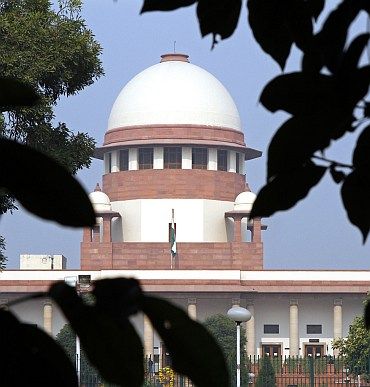 Keen to scrap the collegium system, government on Monday introduced a Constitution Amendment Bill in Lok Sabha to establish a six-member body for appointment of judges to the Supreme Court and the high courts.
Keen to scrap the collegium system, government on Monday introduced a Constitution Amendment Bill in Lok Sabha to establish a six-member body for appointment of judges to the Supreme Court and the high courts.
Besides the Constitutional Amendment Bill, Law Minister Ravi Shankar Prasad introduced an enabling bill – the National Judicial Appointments Commission Bill, 2014.
While the Constitution (121st Amendment) Bill, 2014 seeks to put the proposed commission and its entire composition in the Constitution, the other legislation lays down the procedure to be followed by the proposed body for appointment of Supreme Court judges and transfer and appointment of chief justices and other judges of the High Courts.
As per the proposal, Chief Justice of India will head the NJAC. Besides the CJI, the judiciary would be represented by two senior judges of the Supreme Court. Two eminent personalities and the law minister will be the other members of the proposed body.
To allay fears of the judiciary, the composition of the Commission has been given a constitutional status to ensure that any future government does not tweak the composition through an ordinary legislation.
While the constitutional amendment bill requires two-third majority, an ordinary bill requires a simple majority.
The two eminent personalities will be selected by a collegium of Chief Justice of India, the prime minister and Leader of the Opposition in Lok Sabha or the leader of the single-largest opposition party in the Lower House.
The provision of having the leader of the single-largest opposition party has been made as there is confusion over Congress getting Leader of the Opposition post in Lok Sabha.
One of the eminent persons will be nominated from among the persons belonging to the Scheduled Castes, Scheduled Tribes, OBCs, minorities or women. The term of the two eminent persons will be for a period of three years with a provision that they cannot be renominated.
The bill provides that if two members of the NJAC do not agree, then the appointment will not go ahead. It also provides that the President can send back the recommendation of the panel back for reconsideration. But if the panel reiterates the recommendation “unanimously”, the President will have to go ahead with the appointment.
It states that the NJAC will seek views of the governor and chief minister of the concerned state in writing before appointing or transferring a judge of that High Court.
The bill makes it clear that the proposed body will recommend for appointment the senior-most judge of the Supreme Court as the Chief Justice of India. But the judge under consideration will not attend the meeting in which is or her name is recommended.
Besides Amending Article 124 to make way for the NJAC, Article 124A will be inserted to describe the composition of the body. The proposed Article 124B describes the “duty” of the Commission to recommend persons for appointment as Chief Justice of India, Chief Justices of the 24 high courts and transfer and appointment of judges of the high courts.
The Constitution Amendment Bill also seeks to insert Article 124C in Constitution to give Parliament power to make law regarding judicial appointments. Besides, it seeks to amend a few other articles related to judicial appointments.
An earlier effort by the National Democratic Alliance-I government in 2003 to replace the collegium system met with no success. The then NDA government had introduced a Constitution amendment bill but Lok Sabha was dissolved when the bill was before a Standing Committee. The United Progressive Alliance II had also brought a similar bill, but it lapsed.
After any Constitutional amendment bill gets Parliamentary nod, it is sent to all the states and 50 per cent of the state legislatures have to ratify it. The process could take up to eight months. After ratification, the government sends it to the President for his approval.
The practice of judges appointing judges started after 1993, replacing the system of government picking judges for higher judiciary comprising the Supreme Court and high courts. The move to set aside the 1993 Supreme Court judgement, which led to the collegium system, requires a constitutional amendment.











 © 2025
© 2025